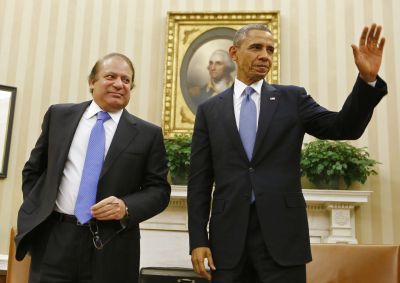 | « Back to article | Print this article |
 The United States will provide security assistance to Pakistan to help it build counter-insurgency and counter-terrorism capabilities under a joint five-year plan developed by the two countries.
The United States will provide security assistance to Pakistan to help it build counter-insurgency and counter-terrorism capabilities under a joint five-year plan developed by the two countries.
Reflecting a new bonhomie in bilateral ties which got a big boost by Pakistan Prime Minister Nawaz Sharif's recent visit to Washington, a high-powered defense delegation is scheduled to visit the Pentagon later this week for the next round of crucial meeting of the Defence Consultative Group.
The US-Pakistan Defence Consultative Group meeting tentatively would give a final shape to the five-year security assistance plan, developed during a meeting of defense officials of the two countries in February and is believed to zero in on the military hardware that the US would be providing to Pakistan.
Informed sources said after two meetings in the last one year -- Defence Consultative Group in December 2012 and Defence Resourcing Conference in February 2013 -- officials of US and Pakistan were able to develop a joint five-year plan for how security assistance would feed into defense cooperation on counter-insurgency and counter-terrorism issues and to help build Pakistan's capabilities in these areas.
Officials from Pakistan and the US during these two meetings identified seven broad areas of security assistance cooperation, which sources said initially covered 11 areas.
It is part of this decision that the Obama administration this summer (July-August) informed the Congress of a number of appropriations related to security assistance to Pakistan.
This totalled about $1.4 billion in military assistance of which roughly $425 million was in Pakistan counter- insurgency and capabilities fund (PCCF) and the rest about $1 billion was in foreign military financing.
In addition, the notifications included roughly $260 million of civilian assistance, of which $230 million focused on energy programming for Pakistan and $30 million was the State Department funding for civilian police programmes.
In September, the US also released to Pakistan $322 million as a reimbursement for military expenses made by Pakistan towards America's war against terrorism.
During these meetings, US and Pakistani officials agreed that the equipment security assistance would support seven core capabilities like night vision, precision strike, counter IED, survivability, border security, communications and maritime operations, maritime security.
Now the security assistance under FMF would be allotted along these lines. The equipment needs are being negotiated between both the US and Pakistan.
This week's US-Pakistan Defence Consultative Group meeting would identify and negotiate on the equipment and military hardware under these seven core capabilities.
Under Congressional requirements, the security assistance has to be made available only to support counter-terrorism and counter-insurgency capabilities.
The Defence Consultative Group meeting would be followed by another Defence Resourcing Conference in February.
However, during these meetings, US officials ruled out providing equipment that enhanced Pakistan's conventional capabilities, arguing that such US' security assistance can only support counter-terrorism and counter-insurgency operations -- that is a Congressional legislative operations.
As such things like air defense system would fall outside of this counter-terrorism operational support.
The revival of security assistance is reflective of the improved relationship between the US and Pakistan, after more than two years of tensions during the period of 2011 and 2012, including the Raymond David episode, killing of Osama bin Laden and the closer of the crucial ground lines of communications.
As a result, the security assistance was slowed and calibrated. But situation changed gradually and the military-to-military relationship started building and serious effort was made to bring it back on track through a series of high-level meetings and visits.
Image: US President Barack Obama waves after a meeting with Pakistan's Prime Minister Nawaz Sharif at the White House on October 23, 2013
Photograph: Larry Downing/Reuters